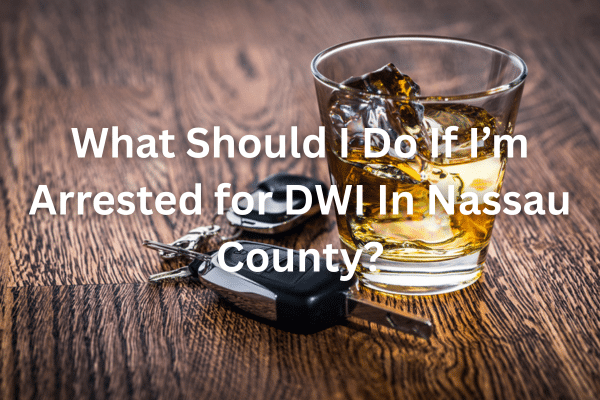

If you’ve just been arrested for DWI in Nassau County, you’re probably scared, overwhelmed, and unsure what happens next. I get it. I’ve spent more than three decades defending people in exactly this position, and my first message is simple: you have options, and the steps you take in the next few days can make a real difference in your case.
The first few minutes of any DWI case are critical. Be respectful, provide your license and registration, but do not volunteer information. You are required to identify yourself; you are not required to explain where you’re coming from, what you drank, or how much. Politely say, “I want to remain silent and I want a lawyer.” Do not argue at the roadside or at the precinct. Every word and every movement may be recorded and later used in court.
People often think they can explain themselves. “I’m tired,” “I only had one,” “I’m bad with balance tests.” Those explanations rarely help and often make things worse. Officers are trained to ask questions that produce admissions. Short, courteous answers to identifying questions only. Nothing more.
Officers may ask you to perform field sobriety tests (walk-and-turn, one-leg stand, HGN). These are subjective and often administered under poor conditions—wind, uneven pavement, headlights, stress. Whether to attempt them is case-specific; many drivers don’t realize they are not legally required to perform field sobriety tests in New York. A breath, blood, or urine test (the “chemical test”) is different. New York’s implied consent law means refusing the chemical test can trigger an immediate license suspension and a separate DMV hearing that can result in a one-year revocation and civil penalties, even if the criminal case is later reduced or dismissed. On the other hand, taking the test may create evidence the prosecution uses against you. There isn’t a one-size-fits-all answer, but if you refused or if you took the test, I could still help you navigate the consequences and build a strategy.
Your first court appearance, or arraignment, typically takes place in Nassau County District Court in Hempstead. If there is a breath test result of .08 or higher, the judge can order a “suspension pending prosecution.” In many first-offense cases, you may be eligible to request a hardship privilege so you can drive for work, school, or essential medical care while your case is pending. Timing matters: hardship applications are best handled promptly and with documentation. If your case involves an alleged refusal, the court will impose a temporary suspension, and you’ll receive notice of a DMV refusal hearing. We prepare you for both court and DMV from day one.
Early intervention lets me secure video, 911 calls, calibration and maintenance records for the breath machine, body-worn camera footage, and names of potential civilian witnesses. The sooner I’m involved, the better our chances of preserving key evidence and avoiding preventable license consequences. If you contact me in the first 24 hours, I can often speak with family, arrange surrender (if needed), and help you avoid common pitfalls.
If the court suspends your license, do not drive unless you have a hardship privilege or a conditional license later through the DMV. A charge for aggravated unlicensed operation can turn a manageable case into a much more serious situation. Ask me what transportation options or privileges might apply in your specific circumstances.
As soon as you’re safe at home, write down what happened, step by step: where you were coming from, what you ate and drank (and when), where you were stopped, what the officer said and did, what tests were requested, and how you performed. Save receipts, texts, maps history, photos, and names of anyone who saw you before the stop. Small details—like a pothole near the stop location or a late-night allergy attack—can matter.
Every case is different, but a strong defense usually includes several layers:
Local practice matters. Arraignments move quickly; judges expect organized documentation for hardship applications; and prosecutors watch for early compliance with any court-ordered conditions. My team helps you complete alcohol assessments when necessary, schedule DMV hearings, and take the right steps toward the best possible resolution from day one.
Even a first-offense DWI can bring fines, surcharges, license suspensions, ignition interlock upon conviction, and a permanent criminal record. Insurance premiums can rise, professional licenses can be affected, and travel plans can be disrupted. The goal is to minimize or avoid these consequences through careful, aggressive, and informed defense work tailored to Nassau County practice.
I’ve represented thousands of people facing DWI charges across Long Island, and I never forget that you’re a person with a job, a family, and a future. My commitment to client satisfaction is the core of my practice. I’ll keep you informed, return your calls, and fight to protect your license, your record, and your peace of mind.
If a case leads to a DWI conviction, New York requires an ignition interlock device for a period set by the court. There are often ways to manage this burden, and in many cases we can avoid a criminal DWI conviction altogether. Let’s talk early so we can position your case for the most favorable outcome.
If you or a loved one has been arrested for DWI in Nassau County, contact me today. I’m Ed Palermo, and for over three decades I’ve defended people in Nassau County District Court and throughout Long Island. I’ll review your situation, explain your options in plain English, and get to work immediately to protect your driver’s license and your future.